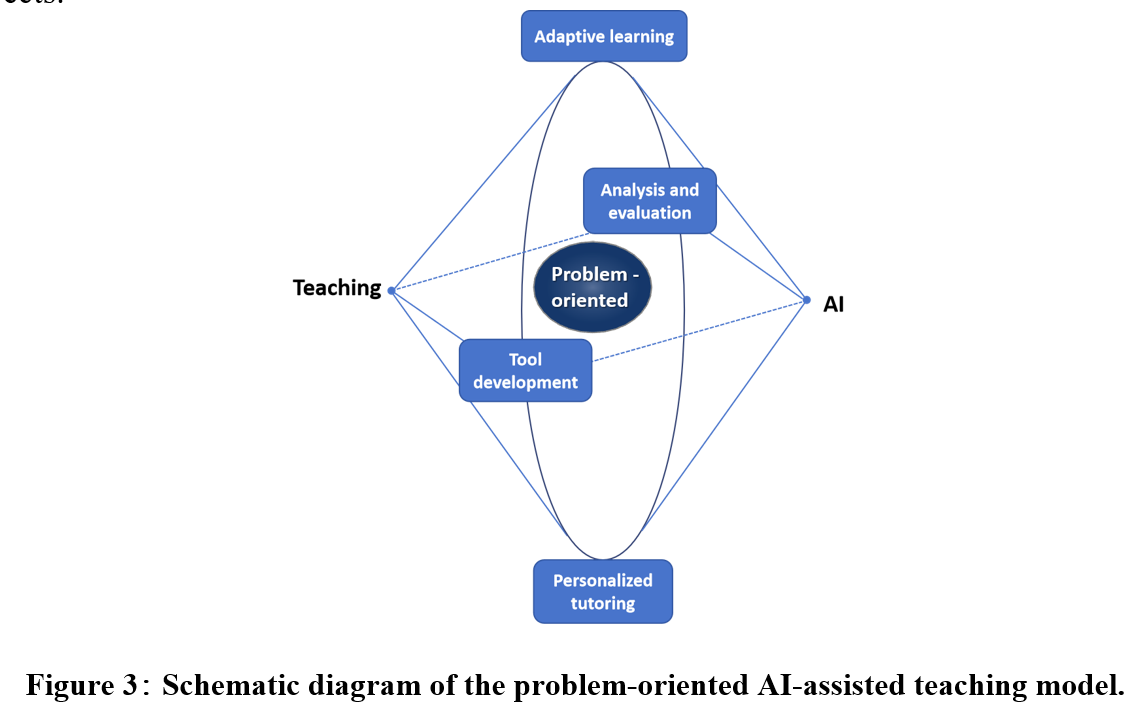A Problem-Oriented Training Paradigm for Undergraduate Students in Materials Science in the Era of Artificial Intelligence
Main Article Content
Abstract
In the era of artificial intelligence (AI), the fields of science and technology are experiencing profound changes, creating an unprecedented demand for talent development. This study comprehensively explores the extensive influence of AI on materials science, including accelerating materials discovery and optimization, transforming research paradigms and methods, and strengthening interdisciplinary cooperation. Based on this, a "problem-oriented" talent training model for the materials science major is proposed. This model integrates AI technology and is designed to cultivate students' practical problem - solving abilities, innovative thinking, and practical skills to meet the needs of the intelligent development of the industry. This paper also addresses the challenges that may be faced during the implementation of this training model, such as the difficulty of curriculum integration, the shortage of practical teaching resources, and the imperfection of the teaching evaluation system. Through continuous optimization and improvement, this training model is anticipated to cultivate high-quality innovative talents in the materials science field and promote the intelligent development and innovation of the industry.
Article Details

This work is licensed under a Creative Commons Attribution-NonCommercial-NoDerivatives 4.0 International License.
References
Jan, Z., Ahamed, F., Mayer, W., Patel, N., Grossmann, G., Stumptner, M., & Kuusk, A. (2023). Artificial intelligence for industry 4.0: Systematic review of applications, challenges, and opportunities. Expert Systems with Applications, 216: 119456. https://doi.org/10.1016/j.eswa.2022.119456
Liu, Y., Yang, Z., Yu, Z., Liu, Z., Liu, D., Lin, H., Li, M., Ma, S., Avdeev, M., & Shi, S. (2023). Generative artificial intelligence and its applications in materials science: Current situation and future perspectives. Journal of Materiomics, 9(4), 798-816. https://doi.org/10.1016/j.jmat.2023.05.001
Vasylenko, A., Gamon, J., Duff, B. B., Gusev, V. V., Daniels, L. M., Zanella, M., Shin, J. F., Sharp, P. M., Morscher, A., Chen, R., Neale, A. R., Hardwick, L. J., Claridge, J. B., Blanc, F., Gaultois, M. W., Dyer, M. S., & Rosseinsky, M. J. (2021). Element selection for crystalline inorganic solid discovery guided by unsupervised machine learning of experimentally explored chemistry. Nature Communications, 12(1), 5561. https://doi.org/10.1038/s41467-021-25343-7
Park, S., Kayani, S. H., Euh, K., Seo, E., Kim, H., Park, S., Yadav, B. N., Park, S. J., Sung, H., & Jung, I. D. (2022). High strength aluminum alloys design via explainable artificial intelligence. Journal of Alloys and Compounds, 903: 163828. https://doi.org/10.1016/j.jallcom.2022.163828
Zhu, Z., Ng, D. W. H., Park, H. S., & McAlpine, M. C. (2021). 3D-printed multifunctional materials enabled by artificial-intelligence-assisted fabrication technologies. Nature Reviews Materials, 6(1), 27-47. https://doi.org/10.1038/s41578-020-00235-2
Sanchez-Gonzalez, A., Micaelli, P., Olivier, C., Barillot, T. R., Ilchen, M., Lutman, A. A., Marinelli, A., Maxwell, T., Achner, A., Agåker, M., Berrah, N., Bostedt, C., Bozek, J. D., Buck, J., Bucksbaum, P. H., Montero, S. C., Cooper, B., Cryan, J. P., Dong, M., Feifel, R., Frasinski, L. J., Fukuzawa, H., Galler, A., Hartmann, G., Hartmann, N., Helml, W., Johnson, A. S., Knie, A., Lindahl, A. O., Liu, J., Motomura, K., Mucke, M., O’Grady, C., Rubensson, J. E., Simpson, E. R., Squibb, R. J., C. Såthe, C., Ueda, K., Vacher, M., Walke, D. J., Zhaunerchyk, V., Coffee, R. N., & Marangos, J. P. (2017). Accurate prediction of X-ray pulse properties from a free-electron laser using machine learning. Nature Communications 8(1), 15461. https://doi.org/10.1038/ncomms15461
Hmelo-Silver, C. E. (2004). Problem-based learning: What and how do students learn? Educational Psychology Review 16(3), 235-266. https://doi.org/10.1023/B:EDPR.0000034022.16470.f3
Jonassen, D. H., & Khanna, S. K. (2011). Implementing problem based learning in materials science. 2011 ASEE Annual Conference & Exposition. https://peer.asee.org/18102
Zhang, R., Xu, T., Yao, B., &Liu, Z. (2022). Perspectives in the new era of materials intelligent design. Materials Lab, 1(2), 220017. https://doi.org/10.54227/mlab.20220017
Ramprasad, R., Batra, R., Pilania, G., Mannodi-Kanakkithodi, A., & Kim, C. (2017). Machine learning in materials informatics: recent applications and prospects. npj Computational Materials, 3(1), 54. https://doi.org/10.1038/s41524-017-0056-5
Liu, Y., Zhao, T., Ju, W., & Shi, S. (2017). Materials discovery and design using machine learning. Journal of Materiomics 3(3), 159-177. https://doi.org/10.1016/j.jmat.2017.08.002
Jablonka, K. M., Ongari, D., Moosavi, S. M., & Smit, B. (2020). Big-data science in porous materials: Materials genomics and machine learning. Chemical Reviews, 120(16), 8066-8129. https://doi.org/10.1021/acs.chemrev.0c00004
Wang, Z. & Zhu, X. (2024). Enhancing nanocrystal synthesis: A comparative study of online artificial intelligence optimization and offline high-throughput experimentation in chemical material discovery. ACS Applied Nano Materials, 7(6), 6499-6505. https://doi.org/10.1021/acsanm.4c00255
Liu, C., Wang G. C., & Wang, H. F. (2025). The application of artificial intelligence in engineering education: A systematic review. IEEE Access, 13, 17895-17910. https://doi.org/10.1109/ACCESS.2025.3532595
Xu, W. & Ouyang, F. (2022). The application of AI technologies in STEM education: a systematic review from 2011 to 2021. International Journal of STEM Education, 9(1), 59. https://doi.org/10.1186/s40594-022-00377-5
Bravo, F. A., & Cruz-Bohorquez, J. M. (2024). Engineering education in the age of AI: Analysis of the impact of chatbots on learning in engineering. Education Sciences, 14(5), 484. https://doi.org/10.3390/educsci14050484
Almasri, F. (2024). Exploring the impact of artificial intelligence in teaching and learning of science: A systematic review of empirical research. Research in Science Education, 54(5), 977-997. https://doi.org/10.1007/s11165-024-10176-3
Adewale, M. D., Azeta, A., Abayomi-Alli, A., & Sambo-Magaji, A. (2024). Impact of artificial intelligence adoption on students' academic performance in open and distance learning: A systematic literature review. Heliyon, 10(22), e40025. https://doi.org/10.1016/j.heliyon.2024.e40025
Bettayeb A.M., Abu Talib M., Sobhe Altayasinah, A.Z., & Dakalbab, F. (2024) Exploring the impact of ChatGPT: conversational AI in education. Frontiers in Education, 9, 1379796. https://doi.org/10.3389/feduc.2024.1379796


